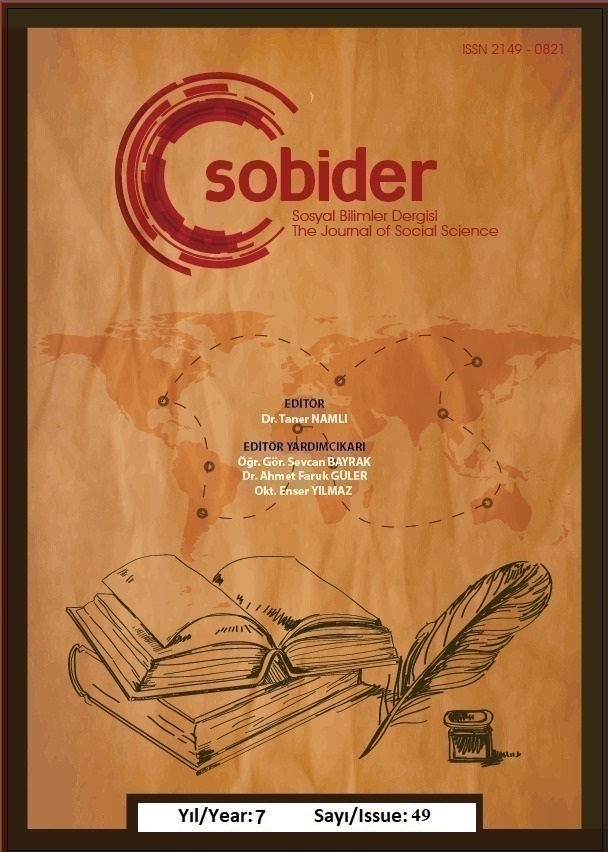Author :
Abstract
Günlük hayatın tezahüründe ve algılanmasında beden önemli bir rol oynamaktadır. Bedenlerin birbirlerini algılama durumları ise öznede bir kendilik ifadesi oluşturmaktadır, zira beden aynı zamanda bir söylem biçimidir ve bu bağlamda söylem aslında tavır ve tutum olarak kendini açığa çıkarmaktadır. Söz konusu söylem biçimlerinin özellikle kadın bedenine nüfuz ederek, kadının kendisine yönelik algısının kendisinin dışında eril özneler tarafından kurgulanması ise, kadın bedenini hegemonik bir imlem içerisine hapsettiği yadsınamaz bir gerçekliktir. Bu bağlamda araştırmanın amacı, Simone de Beauvoir’e ve Judith Butler’a referansla öznenin kendi varlığını keşfetmesinin içeriğinde kendisini başkasının varlığında nasıl ortaya çıkardığı ve kendi iradesi ile dışa bağımlılığı arasındaki diyalektik etkileşimin Bachmann’ın Malina adlı eserindeki izdüşümleri ile tespit edilmesi ve elde edilen verilerin hermeneutik yöntem ile irdelenmesidir.
Keywords
Abstract
In the manisfetation and perception of daily life, the body has a significant role. Bodiesʼ perception of each other originates selfdom in the subject inasmuch as the body is also a form of discourse. Concordantly, discourse actually reveals itself as attitude and behaviour. These aforementioned forms of discourse develop especially with in the domain of female body. The womanʼs perception of herself was created by masculine subjects besides herself. Regarding this, imprisoning the female body in a hegomonic sign is an incontroverrible fact. In this context, the purpose of this study is how the subject reveals oneself in someone else in the subjectʼs discovery of own existence with reference to Simon de Beauvoir and Judith Butler, and to determine the dialectial interaction between his/ her own will and external dependence with the footprints of Bachmannʼs work named Malina, and to scrutinize the analysis of the data with hermeneutic method.
Keywords
- Aşkın, M. (2007). Kimlik ve Giydirilmiş Kimlik, Atatürk Üniversitesi Sosyal Bilimler Enstitüsü Dergisi, 10 (2), 213-220.
- Aytaç, G. (1978). Çağdaş Alman Edebiyatı, Ankara: Ankara Üniversitesi Dil ve Tarih- Coğrafya Fakültesi Yayınları.
- Bachmann, I. (1978). „Biographisches“, In: Werke IV, 1952, (Hrsg. Christine Koschel, Inge von Weidenbaum, Clemens Münster), Vierter Band: Essays, Reden, Vermischte Schriften, Anhang, Phonographie, München, Zürich: Piper Verlag.
- Bachmann, I. (2017). Malina (Ahmet Cemal Çev.), İstanbul: Yapı Kredi Yayınları.
- Butler, J. (2016). Cinsiyet Belası – Feminizm ve Kimliğin Altüst Edilmesi (Başak Ertür, Çev.), İstanbul: Metis Yayınları.
- Descartes, R. (2011). Meditasyonlar (Aziz Yardımlı, Çev), İstanbul: İdea Yayınları.
- Duttweiler, S. (2013). Die Beziehung von Geschlecht, Körper und Identität als rekursive Responsivität. Eine Skizze, Freiburger Zeitschrift für Geschlechterstudien, 19(2): 19-36.
- Heidegger, M. (2011). Varlık ve Zaman (Kaan H. Ökten, Çev.), İstanbul: Agora Kitaplığı.
- Jergus, K. (2012). “Politiken der Identität und der Differenz- Rezeptionslinien Judith Butlers im erziehungswissenschaftlichen Terrain”, in Judith Butler: Pädagogische Lektüren, (Hrsg. Norbert Ricken & Nicole Balzer), s. 29-53, VS Verlag für Sozialwissenschaften Springer Fachmedien, Wiesbaden.
- Karabacak, İ. (2013). Ingeborg Bachmann’ın “Malina” Adlı Eserinin Feminist Açıdan İncelenmesi, Yalova Sosyal Bilimler Dergisi, Sayı 5, 235-242.
- Koç, E. (2015). Simone de Beauvoir’in “İkinci Cins”i: Öteki Olarak Kadın, Sosyal Bilimler Dergisi, 2 (4), 1-17.
- Nietzsche, F. (2006). Tarihin Yaşam İçin Yararı ve Sakıncası: Zamana Aykırı Bakışlar 2 (Mustafa Tüzel, Çev.), İstanbul: İthaki Yayınları.
- Ponty, M. M. (2016). Algının Fenomenolojisi (Emine Sarıkartal ve Eylem Hacımuratoğlu, Çev.), İstanbul: İthaki Yayınları.
- Sarı, A. (2006). Türk ve Alman Poetikasının Kitabı, Konya: Salkımsöğüt Yayınları,
- Simondon, G. (2019). Hayvan ve İnsan Üzerine İki Ders (Emre Sünter, Çev.) İstanbul: Norgunk Yayınları.
- Spinoza, B. (2009). Tractatus Politicus: Politik İnceleme (Murat Erşen, Çev. )Ankara: Dost Kitabevi.
- Steinert, D. (2006). Identität in Sprachphilosophie und Literatur: Die Konstitution von Wirklichkeit und Geschlecht bei Judith Butler und Elfriede Jelinek, (Internet: https://www.grin.com/document/66177 abgerufen am 03.02.2020).
- Straub, J. (2011). “Identität” in Handbuch der Kulturwissenschaften Band 1: Grundlagen und Schlüsselbegriffe, (Hrsg. Friedrich Jaeger & Burkhard Liebsch), s. 277-363, Springer Verlag, Berlin, Heidelberg.
- Şen, S. (2006). Laik ve Anti-Laik Söylemlerde Beden İmgesi: Söylemin ‘Beden’selleşmesi, Çağdaş Türkiye Tarihi Araştırmaları Dergisi, 5(12), 81-102.
- Tokdemir, A. (2000). Yabancı Dil Derslerinde Edebi Metin ve Ingeborg Bachmann’ın “Reklame” Başlıklı Şiiri, Selçuk Üniversitesi Sosyal Bilimler Enstitüsü Dergisi, Sayı 6, 341-347.
- Zengin, B. (2016). Feminist Edebiyat Biliminin Temelleri ve Almanya’daki Yansımaları, Sivas: Dilek Ofset Matbaacılık.





